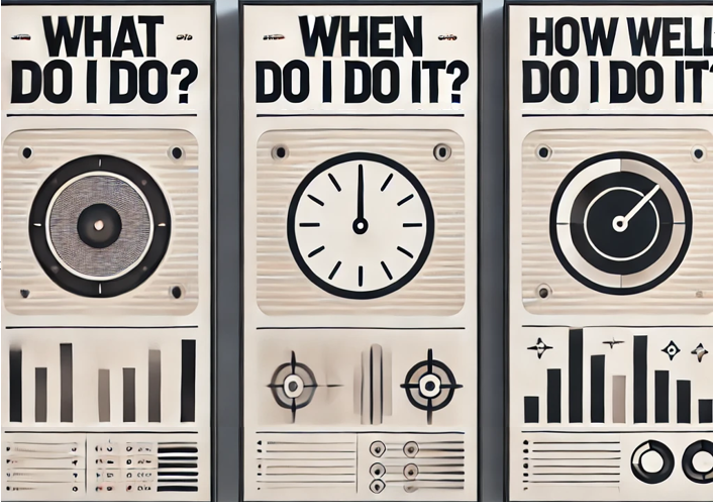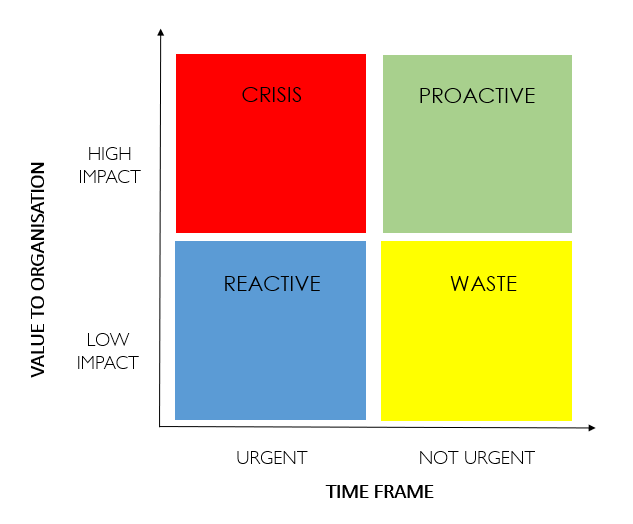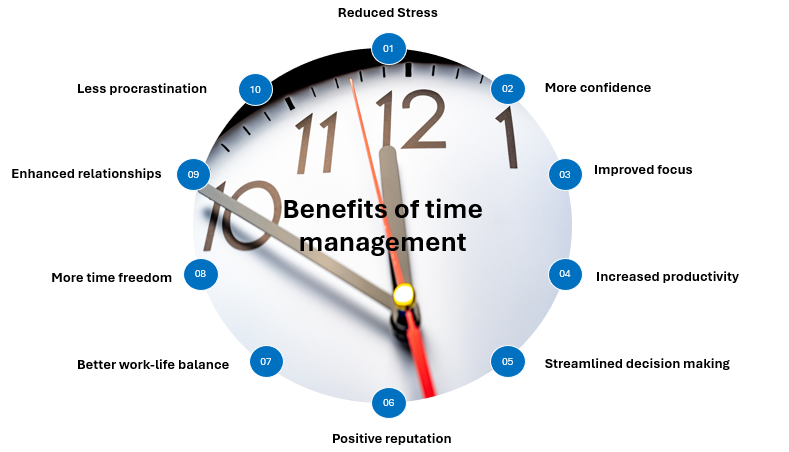A Definition of Time Management
The literature has differing views on a definition of time management. One view is that time management involves organizing, planning, and controlling time to achieve more in less time ((e.g. Claessens et al., 2007) This definition views time management as a set of behaviors to maximize goal-directed behavior but also views time management as a way of monitoring or controlling time
However, while we believe that effective behaviors to maximize the use of time is aligned with our definition of time management, we are more aligned with Marquis and Huston (2009) who argue that time cannot be managed at all and that we can only manage ourselves and the events in relation to time.
So time management is more about self-management.
This perspective is important as because managing your time well is about having self-awareness and self-control, applying discipline, and having a high degree of personal organization.
 The What, When and How Well Questions of Time Management
The What, When and How Well Questions of Time ManagementThis requires intentional choices! Choices that include questions of 'what', 'when', and 'how well'.
For example:
- What do I want to do
- When do I want to do it
- How well do I want to do it?
So the more accurate your decisions are about what, when and how well - will determine how well you manage yourself with time.
Let's deep dive into this in a bit more detail.
The 'What' Question when it comes to a definition of time management
This involves asking the question 'What do I want to do?'
What do you decide to do and not do, and importantly what do you decide not to do? From a time management point of view, the more aligned your actions are with your overall goals and beliefs, the more effective you will be. This is where time management skills come into play.
For example, if you are procrastinating on your most important activities. or you don't know what matters most to you, this is likely to increase your stress and is where time management skills come into play. Some of these skills include
- setting clear goals. This provides clarity and direction
- create a master task list. This helps you get all the actions into one place so that you can plan your workload
- prioritizing tasks. This can be done with tools such as the Eisenhower matrix to categorize urgent and important tasks. The key here is to focus on high-priority tasks first and then make decisions about what you will delegate or defer.

The 'When' Question when it comes to a definition of time management
This involves asking the question 'When do I do it?'
When you want to do it may not be the best time to do it. For example, when there is something hard and important, it may not be best to leave it to the end of the day as willpower is down, decision fatigue is up, and we are more likely to procrastinate.
From another perspective, doing it now is a bad habit. Doing it now pulls you into reactive mode. Email is a great example of this. Just because an email has arrived in my Outlook doesn't mean that I should answer that email now. Being reactive rather than proactive is not a wise way to use time.
This is where time management systems, planners, and diaries can be a great help to balance work and personal life.
Some strategies might include
- time blocking. This is where you allocate time slots in the day for specific tasks so that you can focus on those tasks without distractions.
- Identifying your peak productivity times. When you know your prime time then look to schedule your most important activities into that time.
So, a good working definition of time management involves questions that knowing what to do (i.e. goals and important things) and when to do it. The next question is how well to do it.
The 'How Well' Question when it comes to a definition of time management
This involves asking the question 'How well do I do it?'
When doing a task there are several factors that influence the quality. These could be the level of importance, the time pressure to complete the task, the resources available, and your standards.
Sure, there are unimportant tasks that don't require the same level of attention or effort as critical important tasks. The 'good enough' approach may be more appropriate for less important tasks.
Effective time management involves balancing the quality of the work and the time you have available.
Some strategies to consider here are
- knowing and setting quality standards. For example, not all tasks need to be done perfectly.
- avoid perfectionism. When the task is good enough it is time to move on to the next one. A key idea here is the Pareto principle.
- review, adjust and improve. Here the key is to reflect daily or weekly about what went well and what could be improved. Seeking feedback can be a way to improve and maintain standards.
The three questions form a good working definition of time management and highlight the importance of time management towards a broader concept of life management.
The better you can answer these questions the more effective time management will become. Consider these best quotes on time management as a means to increase the accuracy of your responses to these questions.






New! Comments
Have your say about what you just read! Leave me a comment in the box below.